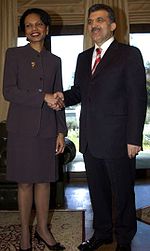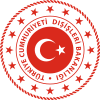Abdullah Gül
Abdullah Gül | |
|---|---|
 | |
| 11th President of the Republic of Turkey | |
| In office 28 August 2007 – present | |
| Prime Minister | Recep Tayyip Erdoğan |
| Preceded by | Ahmet Necdet Sezer |
| 25th Prime Minister of Turkey | |
| In office 18 November 2002 – 14 March 2003 | |
| President | Ahmet Necdet Sezer |
| Preceded by | Bülent Ecevit |
| Succeeded by | Recep Tayyip Erdoğan |
| Personal details | |
| Born | October 29, 1950 |
| Political party | Justice and Development Party |
Abdullah Gül (born October 29, 1950) is the 11th President of the Republic of Turkey. Prime Minister Recep Tayyip Erdogan's selection of Gül as a presidential candidate created a political conflict between Turkey's fiercely secularist constituency and Erdogan’s Justice and Development leadership.
In May 2007, Gül's first bid for presidency was blocked in a legal maneuver, because of the secularist concerns, on account of his former speeches which he gave during his RP years (Secularism is the most disastrous factor that threats Turkey's unity) and his wife’s headscarf.[1] [2] However, following the parliamentary elections in July the same year, which continued AKP control, he was eventually voted in as Turkey's 11th president on August 28, 2007.
Early life
Born in Kayseri to Ahmet Hamdi, a mechanic, and Adviye, his mother, Gül was brought up in a conservative family environment. His family is a very old family serving in Gulluk Camii, in Kayseri, for about a hundred years.[3]
Education
Gül studied economics at the University of Istanbul and wrote his dissertation there. During his graduate education, he studied for two years in London and Exeter. He pursued an academic career after that and worked at the higher education facilities in Adapazarı, collaborating in the establishment of a department for industrial engineering and teaching management courses of future Sakarya University. Between 1983 and 1991, he worked at the Islamic Development Bank (IDB). In 1991, Gül became a lecturer in international management.
Gül became acquainted with right-wing politics early during his high school years. During his university education, he became a member of Islamist-nationalist Millî Türk Talebe Birliği (National Turkish Students' Union) in the line of Necip Fazıl's Büyük Doğu (Grand Orient) current. He was elected a member of the Turkish parliament for Refah Partisi (RP, "the Welfare Party") from Kayseri in 1991 and 1995. In 1999, he kept his seat as a member of Fazilet Partisi (FP, "the Virtue Party"), successor to Refah Partisi. He was among the founders of Adalet ve Kalkınma Partisi ((AKP), "Justice and Development Party). He was elected once again to represent Kayseri, in 2002, and in November 2002 was appointed Prime Minister.
Prime Minister and Foreign Minister
Gül was perceived to be somewhat out of his depth as prime minister[citation needed], particularly in negotiations with the United States surrounding any Turkish participation in the Iraq war. However, after becoming foreign minister in March 2003 he rapidly found his feet in his new role, becoming the key player not only in Turkey's attempts to receive an accession date for the European Union, but also in its attempts to improve relations with Syria and maintain its special relationship with the Turkic-speaking countries of Central Asia and the Caucasus.

On February 6, 2007, Gül flew to the United States to meet with Condoleezza Rice and President George W. Bush in order to dissuade a law from reaching the floor of the US House of Representatives that would recognize the deaths of Armenians in 1915 as the Armenian Genocide
Presidential candidacy
Prime Minister Erdoğan announced on April 24, 2007 that Gül would be the Justice and Development Party candidate in the 2007 presidential election. Previously, there had been speculation that Erdoğan himself would be the party's candidate, which had provoked substantial opposition from secularists.[4][5] When a boycott of opposition parties in Parliament deadlocked the election process, Gül formally withdrew his candidacy on May 6, 2007.
But a few days later, on 11 May when inquired after the alterations to the Turkish constitution which now allowed the people to elect the president directly rather than a parliamentary vote, Gül announced that he was still intending to run on 6 May.[6][7]
Following the July 2007 parliamentary election, the AKP renominated Gül as its presidential candidate on August 13; the election will again be held as a vote of parliament.[8] On August 14, Gül submitted his candidacy application to parliament and expressed his commitment to secularism at a news conference.[9]
On August 28, 2007, he was voted in as Turkey's 11th president in the third round of elections.
Personal life
On August 20 1980, Abdullah Gül married Hayrünnisa Özyurt (b. 1965), his first cousin, when she was 15 years old.[2] The couple has three children, two sons named Mehmet Emre and Ahmet Münir and a daughter named Kübra. He is a dedicated fan of the football club Beşiktaş.[10]
See also; Republic Protests
References
- ^ NY Times
- ^ http://www.cnnturk.com/TURKIYE/haber_detay.asp?PID=318&haberID=384226
- ^ [1]
- ^ "Turkey's ruling party announces FM Gül as presidential candidate", Xinhua (People's Daily Online), April 24, 2007.
- ^ "Turkey 'must have secular leader'", BBC News, April 24, 2007
- ^ "Gül: Adaylığımız devam ediyor" (in Turkish). Retrieved 2007-05-11.
- ^ "Gül adaylıktan çekildi" (in Turkish). Retrieved 2007-05-11.
- ^ "Turkey's ruling party renominates Gul as presidential candidate", Xinhua (People's Daily Online), August 13, 2007.
- ^ "Turkey's Gul vows secular agenda", BBC News, August 14, 2007.
- ^ "Köşk'e üçüncü beşiktaşlı", Haber3, April 24, 2007.
External links
- Official Website of Turkish Presidency
- Talk at the Council on Foreign Relations, Feb 9, 2007
- Turkish Ministry of Foreign Affairs
- Official Website of Abdullah Gul
- Transclusion error: {{En}} is only for use in File namespace. Use {{lang-en}} or {{in lang|en}} instead. Abdullah Gul: International capital’s favorite from soL the online newspaper.
- Abdullah Gül inquiry
- Turkishpolitix.com - Online dossier with news about Abdullah Gül


